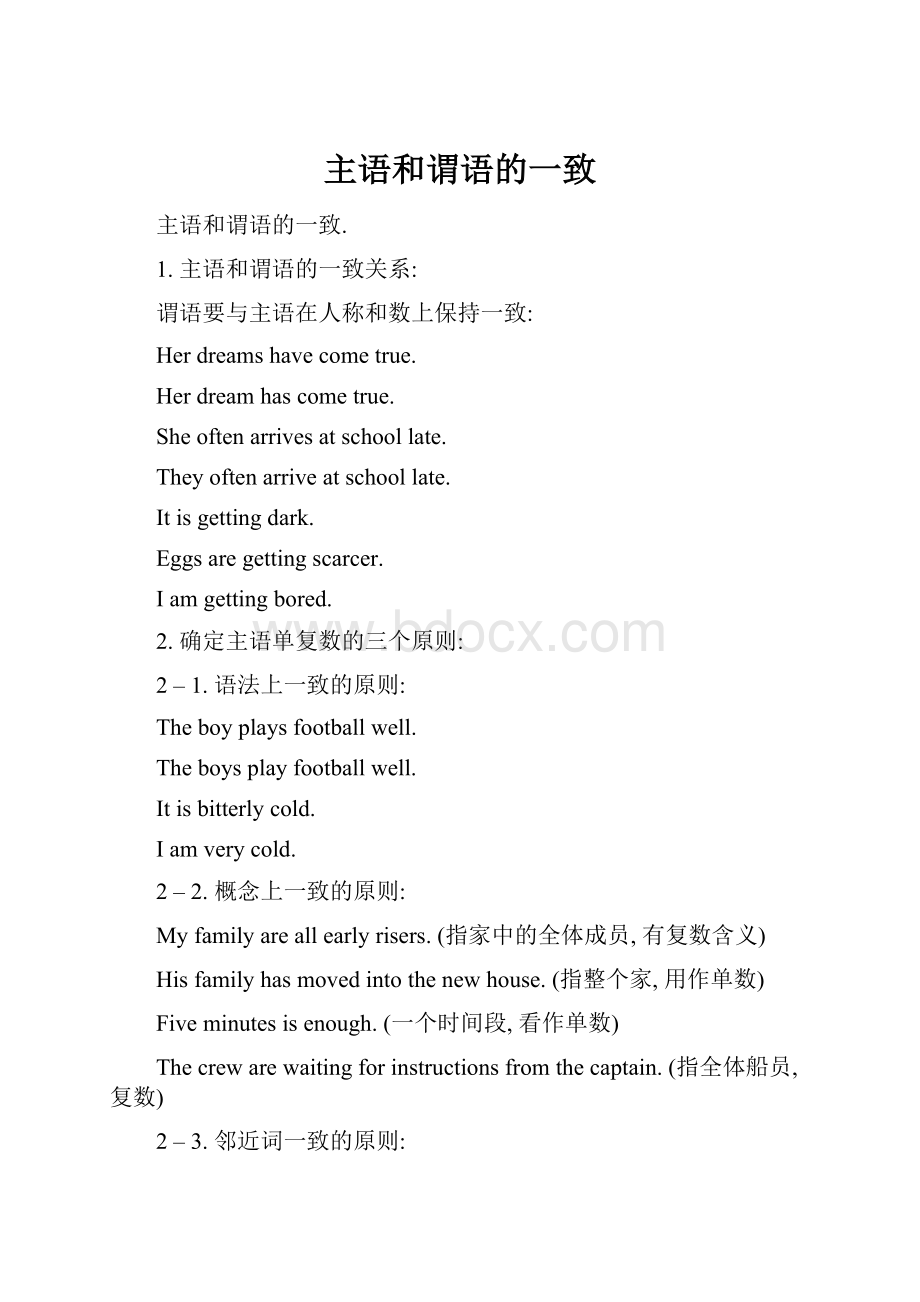主语和谓语的一致.docx
《主语和谓语的一致.docx》由会员分享,可在线阅读,更多相关《主语和谓语的一致.docx(13页珍藏版)》请在冰豆网上搜索。

主语和谓语的一致
主语和谓语的一致.
1.主语和谓语的一致关系:
谓语要与主语在人称和数上保持一致:
Herdreamshavecometrue.
Herdreamhascometrue.
Sheoftenarrivesatschoollate.
Theyoftenarriveatschoollate.
Itisgettingdark.
Eggsaregettingscarcer.
Iamgettingbored.
2.确定主语单复数的三个原则:
2–1.语法上一致的原则:
Theboyplaysfootballwell.
Theboysplayfootballwell.
Itisbitterlycold.
Iamverycold.
2–2.概念上一致的原则:
Myfamilyareallearlyrisers.(指家中的全体成员,有复数含义)
Hisfamilyhasmovedintothenewhouse.(指整个家,用作单数)
Fiveminutesisenough.(一个时间段,看作单数)
Thecrewarewaitingforinstructionsfromthecaptain.(指全体船员,复数)
2–3.邻近词一致的原则:
Neitherhenortheyarewhollyright.
NeitherTomnortheBrownsenjoytheirjourneytoBeijingowingtothebadweather.
Eitheryourkeyormykeyismissing.
Notonlybutalsotheirteacherhasparticipatedintheparty.
HeorIaminthewrong.
-what’sworthvisitingthere?
-well,there’sthepark,thecastleandthemuseum.
3.主谓一致的具体原则:
3–1.根据语法一致的原则确定谓语形式:
单数主语+单数谓语;复数主语+复数谓语
Theteacherencouragesthestudentstospeakfreely.
Mywagesarelow,butmetaxesarehigh.
Theirhousehasnineroom.
Italwayspaystogiveyourpaperonefinalcheck.
在“主语+系词+表语结构”中,系动词要与主语的数保持一致,不受其表语的影响.
Theirgreatestconcernisthechildren.
Themostappreciatedgiftwastheclothesthatyousentus.
Whatweneedmostisbooks.
Paulisfriendswithbill.
在“单数名词(主语)+(together)with+名词”结构中谓语只与主语保持一致,这是因为上述短语只起修饰主语的作用,而非主语的一部分.
短语:
Alongwith,aswellas,inadditionto,accompaniedby,ratherthan,asmuchas,nolessthan,including,besides,except,but,like.
Thefactorywithallitsequipmenthasbeenburnt.
YouaswellasIarewrong.
Themanager,alongwithhissecretaries,isgoingtoadinnerpartytonight.
Anexpert,togetherwithsomeassistants,wassenttohelpinthiswork.
Theteacher,asmuchastheparents,istoblamefortheaccident.
Mr.Robbins,accompaniedbyhiswife,isarrivingtonight.
3–2主语含有and时的谓语形式:
“单数名词+and+单数名词”作主语,谓语动词用复数.
Reading,writingandarithmeticarecalledthethreeR’s.
JoeandBobaresmart.
HeandIaregoodfriends.
Thepoetandthenovelistwerebothpresentatthemeeting.
如果由and所连接的并列主语指的是同一个人或物事,谓语动词用单数.
Thestatesmanandpoetwasengagedinwarfareallhislife.
Ateacherandnovelistisgoingtomakeaspeechinthehall.
A/The+单数名词人+and+单数名词人+单数谓语
指同一个人身兼两种职务.
A/The+单数名词人+and+a/the+单数名词+复数谓语
指不同职务的两个人.
Theconductorandcomposerwasgreetedbyacrowdofpeople.
Theconductorandthecomposerweregreetedbyacrowdofpeople.
一下已被看成一个整体,因而做主语时,谓语动词用单数.
Knifeandfork,needleandthread,acupandsaucer,ahorseandcarriage,trialanderror,lawandorder,etc.
Lawandorderhasbeenestablished.
Breadandbutterisourdailyfood.
Fishandchipsisapopularfastfood.
ThestarsandstripesisthenatioanlflagofUSA.
Thesumandsubstanceofthespeechwasantiwar.
主语为“every/each+单数名词+and+(every/each+)单数名词”时,谓语用单数.
Everyman,woman,andchildneedslove.
Eachboyandgirlwasgivenabook.
Eachbookandeachpaperisheldinplace.
Everyminuteandeverysecondisprecious.
主语为“形容词+and+形容词+不可数名词或复数可数名词”,并且是涉及到该名词的品种或类别时,谓语动词用复数.
Chineseandbritishbeerareservedatthepub.
Coolingdraftbeerisservedatthepub.
Cleveranddullstudentsaretreatedalike.
Thereisablackandwhitepictureonthewall.
当“both…and”连接两个单数名词作主语时,谓语动词用复数.
Bothhisbrotherandsisteraremarried.
Bothwhalesanddolphinsaremammals.
3–3根据邻近词一致的原则确定谓语形式:
用or连接两个名(代)词作主语时,依据“邻近原则”确定谓语形式.
GeorgeorTomiswanted.
GeorgeorIamwrong.
Wereyouorhethere?
用either…or连接连个名代词作主语时,邻近原则.
EitherJohnorhisfriendsaretoblameforthebadresults.
Eithertheshirtsorthesweaterisagoodbuy.
Notonly…butalso…;not…but…连接两个名代词作主语时,邻近原则.
NotonlyMarybutalsoJohnwasinvitedtotheparty.
Notthestudentsbuttheirteacherisinvitedtotheparty.
3–4谓语用单数形式的情况:
动名词,动词不定式或主语从句作主语.
Reasingisagreatpleasureinlife.
Tolivemeanstocreat.
Thatweneedmoretimeisobvious.
数词或“数词+复数名词(表示时间,距离,金额,重量,大小,体积等)”作主语.
Eighthoursofsleepisenough.
Fiveisanoddnumber.
Ahundredmilesisquiteadrive,isn’tit?
Fivetonsisaheavyload.
Tendollarsistoomuchtopayforthatshirt.
复数形式的专有名词作主语.
ThePhilippinesconsistsofmorethan7,000islands.
TheUnitedNationshasitsheadquartersinNewYorkCity.
TheTimeshasalargecirculation.
“manya/morethanone+单数名词”作主语.
Manyalittlemakesamickle.
Manyashiphasbeenwreckedonthoserocks.
Morethanongrammaticalmistakeswasfoundinhiscomposition.
表示群意义的词组,如:
aflockofbirds,apackofdogs,aprideoflions,aherdofcattle,aschooloffish作主语.
Aflockofbirdsiscirclingoverhead.
Theherdofcattleisbreakingaway.
3–5谓语用复数形式的情况:
trousers,pants,pyjamas,shorts,pliers,scissors,pincer,tongs,glasses,spectacles,tights,compasses等;
一般都用复数形式,但当这些词前面有单数量词时,谓语动词常用单数形式.
Wherearemyscissors?
Thereisapairofscissorsonthetable.
有些集合名词作主语时,要用复数形式的谓语.
Sheep,Cattle,Police,Poultry,militia,people等;
Cattlefeedongrass.
Thepolicearelookingintothematter.
“Several/(a)few/both/many+(of+)复数可数名词或上述词”单独用作主语时,谓语用复数形式.
Severalofyouneedtoworkharder.
Severalhavealreadywrittentome.
3–6谓语用单复数皆可的情况:
有些名词形式上是复数,但做主语,谓语多用单数,也可以用复数形式.
Means,works,tidings,headquarter等;
Thefirm’sheadquartersare/isinLondon.
Thegoodtidingcome/comestoolate.
Thereis/arenomeansoffindingoutwhathappened.
Thesteelworksis/areclosedfortheholiday.
数词组成的数学算式作主语,谓语单复亦可:
Twoandthreeis/arefive.
Twicetwomake/makesfour.
一些复数形式疾病名称作主语,通常用单数,复数也可以.
Themeaslesisaninfectiousillness.
Mumpsis/arefairlyrareinadults.
3–7不定代词作主语时的谓语形式:
由any,some,no,every与body,one,thing构成的不定代词作主语或主语的一部分,谓语用单数.
Somebody,anyone,nothing,everyone等;
Everybodyisdoinghisbest.
Thereisnothingyoucandotohelp.
There’ssomethinginterestinginthenewspaper.
“each,each+单数可数名词;eachof+复数名词”作主语时,谓语用单数形式.
Eacharrivesontime.
Eachofthebuildingblocksispaintedadifferentcolour.
Eachboyhastriedtwice.
Each位于复数主语之后,不影响主语的数,e.g.Theboyseachhaveanapple.
Either,neither作主语或主语一部分时,谓语用单数形式:
Eitherisacceptable.
Eitheroneisgoodenoughforme.
Is/areeitherofthemadoctor?
Neitheris/aretoblame.
Neitheransweriscorrect.
Neitherofuswants/wanttodoit.
注意,neither,eitherof和neitherof等用于否定或疑问句时,特别在口语中,也可以跟复数谓语.
All,some,more,most作主语或主语一部分时
上述+不可数名词作主语,谓语用单数;
上述+复数可数名词作主语,谓语用复数形式;
Allhopehasgone.
Somemoneywasspentonbooks.
AllroadsleadtoRome.
MostArabicspeakersunderstandEgyptian.
Allisgoingwell.
There’ssomeinthepot.
Themostyoucanhopeforisfivedollars.
Allareagreedonthispoint.
Somearewiseandsomeareotherwise.
Manypeoplesupporttheproposal,butmoreareagainstit.
All,some,more,most与of连用时:
同样原则;
Allofthisisyours.
Someofthebookisgood.
Someofthefoodhasbeeneaten,butnotallofit.
Mostofhiswritingisrubbish.
MostofthebooksonthatshelfareinEnglish,andtherestareinRussianorFrench.
None作主语或主语一部分时:
-Isthereanymilkinthecup?
-No,thereisnone.
Nonehavearrived.
Nonehasreturnedfromthemeeting.
“Noneof+名词”作主语:
Noneofusisperfect.
Noneoftheguestswanttostay.
Noneofthismoneyisyours.
Noneofthesesuggestionsis/areveryhelpful.
Any用作主语或主语一部分:
Anyisbetterthannone.
Anyisgoodenoughforme.
Givemesomeifthereare/isany.
Ifthereisanytrouble,letmeknow.
Anychildwantstoknowthat.
Therearescarcelyanyflowersinthegarden.
Anyoftheseauthoritiesare/isreliable.
Idon’tthinkanyofuswant/wantstoworktomorrow.
Isthereanymoreofthisstuff?
Half用作主语或主语一部分:
Halfwasdamaged.
Halfarehere.
Ibrokethechocolateintohalves,andhere’syourhalf.
Halfhistimewaswasted.
Halfthesoldierswerekilled.
Halfmyclasshas/haveobtaineddriver’slicenses.
Halfoftheapplewasrotten.
Halfofthetimewasspentinthecountry.
Halfofthefruitisbad.
Halfofmyclasshas/haveobtaineddriver’slicenses.
Halfofthemarehere.
Halfoftheplumsarebad.
Enough作主语或主语的一部分:
Enoughhasbeensaidonthismatter.
Enoughareheretoconstituteaquorum.
Thereisenoughfoodforeverybody.
Thereareenoughplayersforagame.
3–8表示数量的短语作主语时的谓语形式:
Alotof,lotsof,plentyof,thepercentageof,分数词+of,aquantityof,quantitiesof作主语的一部分时:
Two-fifthsofthemoneyismine.
Two-fifthsofthestudentsintheclassarefromArabic-speakingcountries.
Therewasquantitiesofrainthisfall.
Lotsofmyfriendsarehere.
Therewereaquantityofpeopleinthehall.
Agreatdealof,anamountof,(a)littleof,muchof与不可数名词连用时,谓语用单数:
Muchofthatfurnitureisuncomfortable.
Littleoftheequipmentwasstandardized.
Thereisalimitedamountofoilintheworld.
Agoodmany,agreatmany,anumberof与复数可数名词连用,谓语用复数.
Therewereagreat(good)manypeopleinthepark.
Anumberofstudentswereabsent.
“thenumberof+复数名词+单数谓语”,因为thenumberof的词义为“…的数目”,如thenumberofdaysinaweekisseven.
3–9therebe句型中的谓语形式:
Therebe句型中,be的形式通常取决于be后的主语的数;
Therearen’tanylettersinthemailforyoutoday.
Thereisn’tanymailforyoutoday.
There’resomegoodprogramsonTV.
非正式英语中,如果therebe后是由and连接的并列主语,可以用复数谓语,也可以依据邻近词一致的原则来确定谓语形式.
Thereareabluepenandayellownotebookonherdesk.
Thereisabluepenandayellownoteboo